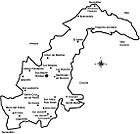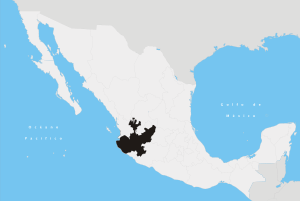San Martín de Hidalgo
San Martín de Hidalgo, formerly San Martín de la Cal, is the largest town and municipal seat of San Martín de Hidalgo Municipality, in Jalisco in central-western Mexico. As of 2015, the town had a population of 7,819. It is located 10 miles southeast of the city of Ameca and 8 miles northwest of the city of Cocula.
San Martín de Hidalgo, Jalisco | |
|---|---|
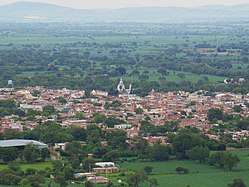 | |
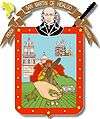 Coat of arms | |
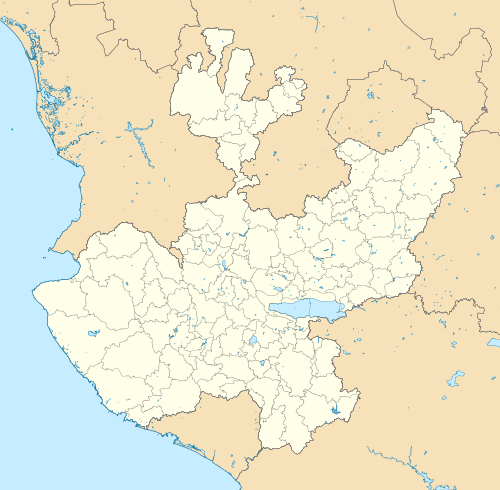 San Martín de Hidalgo, Jalisco Location in Mexico 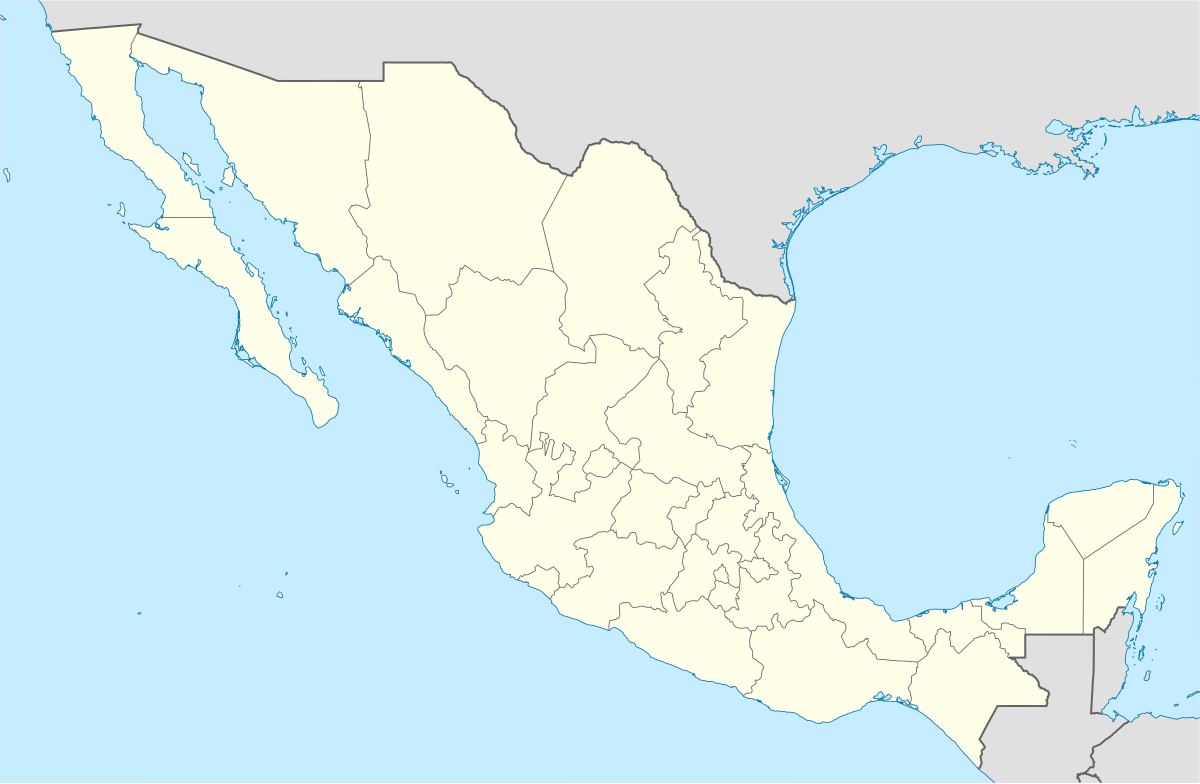 San Martín de Hidalgo, Jalisco San Martín de Hidalgo, Jalisco (Mexico) | |
| Coordinates: 20°26′06″N 103°55′43″W | |
| Country | |
| State | |
| Region | Lagunas |
| Municipality | San Martín de Hidalgo |
| Founded | 1540 |
| Government | |
| • Mayor | Moises Rodríguez Camacho (Movimiento Ciudadano partido político) |
| Area | |
| • Town | 324.57 km2 (125.32 sq mi) |
| Elevation | 1,309 m (4,295 ft) |
| Population (2015) | |
| • Town | 27,777 |
| • Density | 86/km2 (220/sq mi) |
| • Urban | 7,819 |
| Demonym(s) | Sanmartínense |
| Time zone | UTC-6 (Central Standard Time) |
| • Summer (DST) | UTC-5 (Central Daylight Time) |
| Website | Official website |
Tourism in San Martín de Hidalgo mainly relies on either architecture, hiking, or gastronomy.
Toponomy
During the Pre-Columbian era, the town's name was Huitzquilic, which is the Nahuatl word meaning "place of thistles".
History
In 1480, the Coca, Purépecha, and Tepenahuales people settled in Huitzquilic.[1] Under the leadership of Amecatl, present day Ameca, Jalisco, Huitzquilic was ruled by Huitzingarit. The Spanish discovered the town in 1540, during their arrival. The Spanish conquistadors baptized Huitzingarit, the leader, giving him the name of "Martín Santiago Huitzingarit".[1] Because of Huitzingarit's humbleness, the conquistadors awarded him with a plot of land and the title of captain.
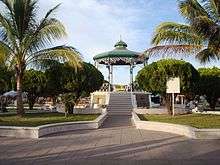
Since being the chief of his town, Huitzingarit's baptismal name was the basis for the new name of the new Spanish settlement, San Martín. The town was later known as "San Martín de la Cal",[1] because of the area's abundance in lime. By 1823, the town is mentioned as a free municipality. It was not until 1883, that "San Martín de la Cal" is changed to "San Martín de Hidalgo", in honor of Miguel Hidalgo y Costilla "the father of the nation".[1]
Venustiano Carranza, President of Mexico, visited San Martín de Hidalgo during the Mexican Revolution in 1916.[1]
Tourism
San Martín de Hidalgo is notable for the following touristic attractions and natural features.
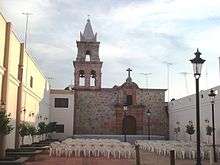
Architecture
- La Capilla de la Concepción, also known as La Conchita, was first utilized as a hospital for the Tepenahuales of the area in the mid-1500s. It is the oldest standing building in the town, the Capilla faces the principal cathedral.
- La Parroquia de San Martín de Tours was built along with the "portales" and the "Plaza de Armas" in 1883, when the town was ranked as a free municipality.
- Templo del Calvario a church in the southern part of the town.
- Los Portales are a collection of two elongated buildings that display arched columned porches on their facades. On the portales, many businesses including shops and restaurants are located. The western portal is sometimes referred to as Portal Zaragoza.
- La Gran Tenoxititlán a grocery store that bears a dignified Neoclassical style that was popular during the 1800s.
Geography
- Sierra de Quila a large government-protected forest that contains Oak, Pine, and Redwood trees. The towns of Mesa del Cobre, El Cobre, and Lagunillas neighbor the breath-taking forest.
- Presa del Guaje a dam near the municipal seat. It is perhaps the largest dam in the municipality, if not the region.
- Presa San Jerónimo newly built dam inaugurated by the state's governor, it is located in the southwestern part of the municipality.
In popular culture
- It has been said that film actress María Victoria, best known as "Inocencia" in La criada bien criada, might have been born in San Martín de Hidalgo or Los Vergara.
- In the Mexican telenovela of Querida Enemiga, the protagonist "Lorena de la Cruz" (Ana Layevska) and the antagonist "Sara de la Cruz" (Carmen Becerra), were said to have been born in San Martín de Hidalgo. This was revealed in an episode where the protagonist's mother Zulema (Socorro Bonilla) was giving her daughter's birth information to the police.
- In 2006, Meza Video Productions filmed the video San Martin de Hidalgo for their "Videos de Mexico" series.[2] The direct-to-video movie revolved around the sightseeing in the town as well as residents' interviews about the locale. It was released on DVD the same year.
Demographics
| Year | Pop. | ±% |
|---|---|---|
| 1900 | 3,243 | — |
| 1960 | 5,242 | +61.6% |
| 1970 | 6,106 | +16.5% |
| 1980 | 5,777 | −5.4% |
| 1990 | 6,858 | +18.7% |
| 1995 | 7,060 | +2.9% |
| 2000 | 7,464 | +5.7% |
| 2005 | 7,001 | −6.2% |
| 2010 | 8,092 | +15.6% |
| 2015 | 7,819 | −3.4% |
| Source: Censo 1900 Sedeur City Population | ||
2010
According to the 2010 Censo General de Población y Vivienda, San Martín de Hidalgo had a population of 8,092 inhabitants, of which 3,907 were male and 4,185 were female.[3] There were 2,205 inhabited houses.[3]
Sister cities
Notable people
- María Guadalupe Urzúa Flores, Municipal President of San Martín de Hidalgo, from 1998 to 2000
References
- "Enciclopedia de los Municipios de México - San Martín Hidalgo". e-local.gob.mx. Archived from the original on 3 June 2007. Retrieved 6 April 2011.
- "Internet Movie Database - San Martin de Hidalgo (Video 2006)". imdb.com. Retrieved 6 April 2011.
- "Catalogo de Localidades - Información de localidad 140770001". ingei.org.mx. Retrieved 26 March 2013.
